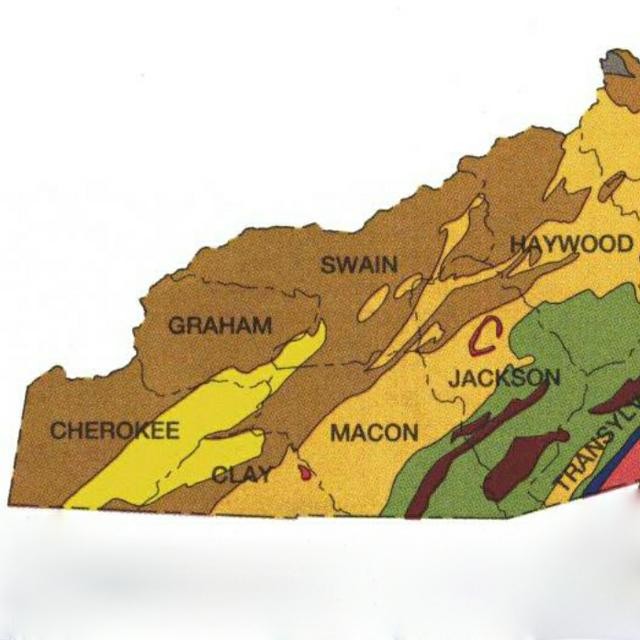As North Carolina paves the way for hydraulic fracturing, or “fracking,” will the mountains see a new form of mining? Recent signals out of Raleigh are both revealing and contradictory.
Mitch Gillespie, an assistant secretary of the N.C. Department of Environment and Natural Resources, told a legislative environmental committee in mid-November that his agency planned to study potential natural gas deposits in Western North Carolina. But a DENR spokesman has since told Carolina Public Press that no funds have been appropriated to conduct such a study.
Last week, DENR public information officer Jamie Kritzer identified the location of the potential study, which had not been previously disclosed. It would include parts of North Carolina’s seven westernmost counties: Cherokee, Clay, Graham, Haywood, Jackson, Macon and Swain.
“Based on rock sampling and geologic mapping conducted by the N.C. Geological Survey during the past three decades, DENR has determined that geologic formations in an area known as the Precambrian rift basin in Western North Carolina have the potential to contain natural gas,” Kritzer said.
In response to recent state legislation, DENR is scouting locations that would be conducive to fracking, a controversial method of extracting natural gas using pressurized water and chemicals.
“The agency is still a long way from determining whether this region contains oil and natural gas resources and whether those resources are abundant enough to make energy exploration feasible,” Kritzer added. “As part of a long-range plan, the department has determined rock sampling and additional research is necessary in this region to determine whether the potential organic-rich formation contains oil or natural gas.”
At an Environmental Review Commission hearing Nov. 13, Gillespie said that DENR had dedicated $11,725 of already appropriated state funds to conduct a study in WNC. Gillespie, a former state representative from McDowell County, is a major fracking proponent who resigned his elected office in January to accept the DENR appointment from Gov. Pat McCrory.
“If you look there in Western North Carolina, there’s a possible [shale gas] basin out there,” Gillespie told the commission. “And we’re going to go out there and grid the county off, a section of the counties off, out there, and go to the highways and the road cuts … to see what the rock looks like, and actually pick up some rocks.”

“We’re looking from Murphy to Manteo, across the state, like the General Assembly told us to, to find our resources,” Gillespie added. He stressed that millions of dollars worth of testing would have to be conducted before any site is judged suitable for fracking.
Kritzer, however, gave a contradictory account of the situation.
“At this time, DENR does not have an appropriation from the General Assembly needed to conduct testing in Western North Carolina,” he said.
Gillespie has not responded to Carolina Public Press’ requests for comment.
Katie Hicks, the Asheville-based assistant director of Clean Water for North Carolina, a nonprofit group that opposes fracking, said she was surprised by DENR’s sudden interest in a WNC location.
“There have been rumors going around, very recently, about potentially some sort of small area of shale gas up in the mountains,” she said. “But rumors only, so we’re just trying to learn more about that.”
Meanwhile, state Rep. Chuck McGrady, a Hendersonville Republican who sits on the Environmental Review Commission and voted against recent legislation that opens to the door to fracking, said initially that the mention of a site in WNC was the first he’d heard. “I don’t know what to make of it,” he said.
According to McGrady, he then contacted both Gillespie and State Geologist Kenneth Taylor seeking more information. The conversations left McGrady convinced, he said, that the chances of finding substantial natural gas deposits in WNC are practically nil.
“There doesn’t seem to be anything to this,” he said. “No one seems to view it as anything worth studying right now. This would be a wild goose chase, from what I can tell.”
In North Carolina, fracking was legalized in the summer of 2012, but the legislature has maintained a moratorium on granting permits for the procedure until rules and regulations can be developed. Last week, the Raleigh News & Observer reported that a Texas-based company is set to begin major pre-fracking studies in three counties in the Piedmont.
— CarolinaPublicPress.org is a nonprofit online news service that provides Western North Carolina with unbiased, in-depth and investigative reporting as well as educational opportunities to journalists, students and others.




A study should be done for North Carolina.. it would add a new dimension to help the citizens of this state benefit from the income generated if in fact gas is found..
let’s not bury our heads in the sand and make this a political issue..